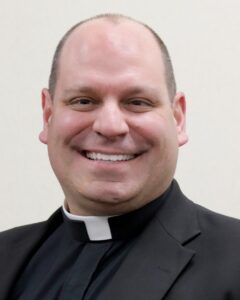Plans great, prayers better — “Made for Mission” book review

Reviewed by Father Luke Spannagel
Blessed day to you all! I’m joyful to say I am back again with another book which Bishop Lou has given to the priests of our Diocese. In Made for Mission, Tim Glemkowski provides another opportunity to grow in our understanding of Evangelization and Discipleship, as well as many practical helps for our parishes as we look to the future. Glemkowski writes from his lived experiences, working in parishes and working with the L’Alto Catholic Institute and Revive Parishes.
Glemkowski founded L’Alto Catholic Institute to “help parishes meet the challenges and opportunities of this New Evangelization head on by helping them Win, Build, and Send missionary disciples” (L’Alto Catholic Institute website). Revive Parishes is an online resource to help parish leaders “so that they can revive their parishes” (Revive Parishes website). You may also recognize Glemkowski from his role in helping organize/promote the National Eucharistic Congress July 17-21, 2024 in Indianapolis.
 CHANGE CULTURE TO MEET CULTURE
CHANGE CULTURE TO MEET CULTURE
As we have heard from other authors in these books Bishop Lou has shared, Glemkowski observes that “parishes can no longer view themselves as gathering places for the faithful. Rather, they must see themselves as missionary outposts in a new and strange land.” As he continues, “Working with parishes, I have become convicted that while the increased conversation around parish renewal happening in the professional Church world today is encouraging, a greater emphasis on helping parishes change their culture to meet the culture head-on needs to be defused more widely. The result is this book” (p.20) . . . “My hope is that you have picked up this book because you have been craving this kind of renewal” (p.158).
Reflecting on his time in service to parishes, Glemkowski is convinced that true renewal for our Catholic Church first needs to happen at the parish level. Gathering that experience, Glemkowski is sharing what he has learned, focusing on “four keys” which will help our parishes moving forward.
MISSION STATEMENT PROVIDED BY FOUNDER
To help get us rightly ordered, Glemkowski outlines our mission. What is that mission? “The mission statement and goal for our parish has already been provided for us by our Founder…’All authority in heaven and on earth has been given to me. Go therefore and make disciples of all nations, baptizing them in the name of the Father and of the Son and of the Holy Spirit, teaching them to observe all that I have commanded you; and behold, I am with you always, to the close of the age’.” (Matthew 28:18-20) (p.65).
How do we know we are living the mission Jesus gave us? According to Glemkowski, “There is one (and only one) true diagnostic marker of a growing and healthy parish: It is forming disciples” (p.37).
There is one (and only one) true diagnostic marker of a growing and healthy parish: It is forming disciples.”
THE FOUR KEYS
So where do we start this “massive project of parish renewal?” Glemkowski describes what he calls “more achievable steps” in the four keys. “I call these . . . the four main drivers that inspire and propel our efforts to renew the culture in our parishes. As we seek to build our parishes into missionary outposts of the New Evangelization, these four keys help us determine simple and actionable ways we get there. They are as follows:
- The vision is clear. We want ours to be a missional parish aimed at introducing parishioners and non-parishioners alike to a life-changing relationship with Jesus Christ.
- There is a clear path to discipleship. We want our parish to be equipped and formed to help people grow into the fullness of mature Catholicism and missionary discipleship.
- Leaders are well-formed, empowered, and sent to bear fruit. We want our parish to form leaders who are fruitful both within the parish and in the larger community in their day-to-day lives.
- Nothing in the parish operates in maintenance mode. We want everything our parish does to be aligned with the mission to form disciples who can make disciples” (p. 27).
Glemkowski goes into greater depth for each of these four keys, as well as providing many practical helps, ranging from helping us see where we are to helping us identify specific areas for change/growth. For example, Glemkowski notes a need to be aligned with the mission in areas of ministry such as sacrament preparation, religious education, communication, and the way we celebrate/welcome people on major liturgical holy days (Christmas, Ash Wednesday, Easter) (p.136).
Along with these explanations, Glemkowski also includes many helpful questions for reflection/discussion which can help bring clarity for a parish, including: a simple quiz for self-diagnosis to see whether or not your parish is a “growing” parish (p.40-41); how to determine the current culture of your parish (p.44); helps for those first encounters and first steps in growing relationships with people (p.100-101); fruitful groups ministry (p.111); how to share the workload (p.124); and practical ideas for pre-evangelization, evangelization, discipleship, apostolates, how to mobilize leaders, aligning ministries, and making the liturgical holy days impactful (p.165-169).
We have to actually believe and act like it is God alone who can do the work that is required. Plans are great; prayers are better.”
THE PRACTICAL POWER OF PRAYER
If all this feels like a lot, Glemkowski is honest in observing that “Making disciples is hard. Creating lasting culture change is hard” (p.76). No doubt, what lies ahead will take true effort and dedication. Of course, we are not alone in this good work. As Jesus promised when he gave us the mission, He remains with us and is strengthening us through the work of the Holy Spirit.
As Glemkowski encourages, “The best way to start renewal: pray consistently, intentionally, over time, with others for God to bring about change. We have to actually believe and act like it is God alone who can do the work that is required. Plans are great; prayers are better. We need both for renewal to happen” (p.29). If you are hoping for growth and change, “I strongly encourage you to ask your parishioners to pray every day for at least a full year for the Spirit to come down in power and lead you to renewal. See what happens. I guarantee the Lord will increase not only the faith of your parishioners, but your own faith as well” (p.67). Let’s prove out his guarantee!
 FATHER LUKE SPANNAGEL is a member of The Post Online’s book review team. He is parochial vicar of St. Mary’s Cathedral, Sacred Heart, St. Joseph, and St. Bernard parishes in Peoria and one of 58 priests serving as National Eucharistic Preachers during the National Eucharistic Revival.
FATHER LUKE SPANNAGEL is a member of The Post Online’s book review team. He is parochial vicar of St. Mary’s Cathedral, Sacred Heart, St. Joseph, and St. Bernard parishes in Peoria and one of 58 priests serving as National Eucharistic Preachers during the National Eucharistic Revival.





